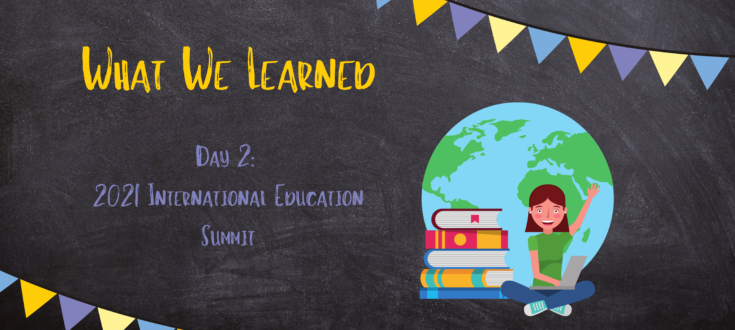What We Learned on Day 2 of IES 2021: Climate advocacy, the Role of US Consulates, Refugee Resettlement, and More!

Last week we wrapped up our 2021 International Education Summit: Your Future in the World. We are so grateful to the many speakers and partner organizations who helped make this event a success. Our remaining four sessions inspired students and attendees to think about big issues that will affect our future and our speakers helped us realize that there are several ways that we can take action to build a better world.
On Wednesday, November 3rd, attendees, including over 250 students at the Winton Woods High School Academy of Global Studies, tuned in for a special discussion on climate change titled Local Solutions to Global Challenges: Creating a Green Cincinnati. This was a very timely session as it took place during COP26 and it was the top issue indicated by students in last year’s survey of issues with the biggest impact on their future. Oliver Kroner, Sustainability Manager for the City of Cincinnati Office of Environment and Sustainability, discussed how climate events such as extreme heat and flooding have impacted residents and are a major financial burden for the city. Kroner outlined the Green Cincinnati Plan, which includes bold proposals for creating a more sustainable city, including a proposal to develop one of the largest solar arrays in the country, develop a 2030 District, and reduce waste. Kelsey Hawkins-Johnson, Community Outreach Coordinator at Groundwork Ohio River Valley (a trust of Groundwork USA), focused on ways in which her organization provides opportunities to take action locally concerning the climate crisis. Ms. Hawkins-Johnson discussed Groundwork’s Climate Safe Neighborhoods Plan, where they work in conjunction with partners from the City of Cincinnati Office of Environment and Sustainability and Green Umbrella to address issues that affect city residents, such as tree canopy coverage and impervious surfaces, the aftermath of historical redlining practices, and heat and flood vulnerability. The findings of this plan spotlight how low income and minority communities are often most at risk to the direct negative impacts of climate change. This work intersects with Ms. Hawkins-Johnson’s past advocacy experience, as she is a former AmeriCorps volunteer who served with Public Allies Cincinnati. She also shared Groundwork’s Green Team opportunities, as high school students can earn money while learning the ropes of conservation and green careers as they help the organization maintain trails, parks, and community spaces in the city. This session was a perfect reminder for our students to “think globally and act locally” when it comes to large issues such as climate change.
On Thursday, November 4th, we explored the role of U.S. consulates as Consul General Bart Twaalfhoven of the Kingdom of the Netherlands joined us for a Flash Chat. Consul General Twaalfhoven reminded us that each nation approaches its consular work a bit differently. The Chicago consulate works to provide information and connections to its networks as well as promote the visibility of the Netherlands in the Midwestern U.S. and vice versa. Key focus areas for this relationship include food and agriculture, Med-tech, and advanced manufacturing and automation. Consul General Twaalfhoven also discussed the Orange on the Lake program they’ve created in Chicago as a mentorship program for Dutch startups and new businesses in the Midwest. This session reminded us of the important work of US consulates and encouraged us to learn more about the US relationship with the Netherlands.
Our partners from the Cleveland Council on World Affairs presented a special session for teachers on Thursday afternoon titled A Look at Immigration and Global Migration: Resources for Educators. Elizabeth Colvin, Global Education Manager for the Cleveland council, discussed the relevance of this issue for examination in the classroom and shared great resources and lesson plans that teachers could use to enhance their discussions. Ms. Colvin engaged attendees in a quick activity on push-pull factors as a way to frame the discussion and model a great way to introduce the topic in the classroom and shared resources from the Choices Program at Brown University, Teaching for Justice, iCivics, Pew Research Center, and many others. Teachers who view the video on our website or YouTube channel can earn 1 CEU by emailing Ms. Colvin at ecolvin@ccwa.org. This was a great way to prepare teachers for our final session on the Afghan refugee crisis!
In our closing event of this year’s summit, Dr. Yael Schacher of Refugees International joined us for After the Airlift: Examining the Afghan Refugee Crisis Post-Taliban Takeover. Dr. Schacher introduced the topic by addressing the misconceptions that most people have about refugee status and resettlement. The definition of refugee was based on the United Nations’ 1951 Convention and includes people who are fleeing their country due to race, membership in a particular social group, political opinion, religion, or national origin. Afghans who fled in 2021 during the Taliban takeover were granted humanitarian parole status, which affects their ability to receive benefits, participate in particular programs, and eventually apply for permanent residency. Dr. Schacher drew parallels between our involvement in Afghanistan with the way we resettled individuals after the Vietnam War and said that the work. She stated that Refugees International focuses on advocacy in the U.S. Congress and the international community in order to provide recommendations to ensure that refugees and asylum seekers are treated with dignity and get the resources that they need. Michelle Harpenau, our Executive Director, also noted the work that local organizations are doing to resettle refugees in our area. Catholic Charities of Southwest Ohio and RefugeeConnect will both work to resettle about 100 individuals and families in the Cincinnati and Northern Kentucky area. This session reminded us that even though the U.S. has left Afghanistan, there is much work to be done to ensure the safety and wellbeing of Afghans who assisted the U.S. during the War on Terror.
If you missed any of these sessions, please view our summit webpage or YouTube channel to view videos, share your feedback, and view educator resources. We will see you again in 2022!


